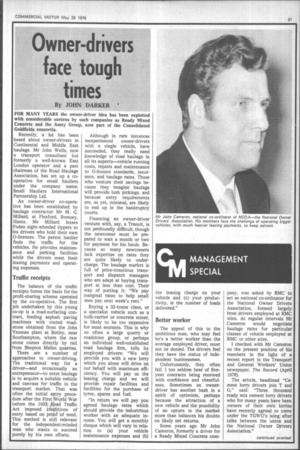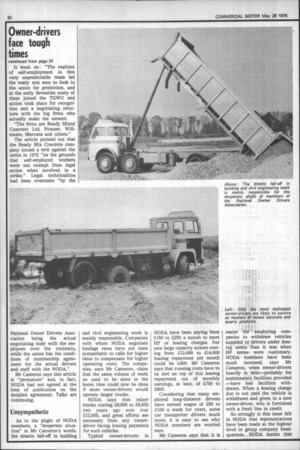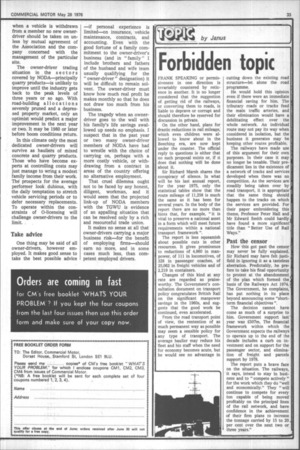C MANAGEMENT m
Page 33

Page 34

Page 35

If you've noticed an error in this article please click here to report it so we can fix it.
SPECIAL
the leasing charge on your vehicle and (c) your productivity, ie the number of loads delivered."
Better worker
The appeal of this to the ambitious man, who may feel he's a better worker than the average employed driver, must not be denied. The drivers feel they have the status of independent businessmen.
Unfortunately, they often fail. I too seldom hear of fiveyear contracts being renewed with confidence and cheerfulness. Sometimes an ownerdriver has another bash in a spirit of optimism, perhaps because the attraction of a new vehicle and the possibility of an upturn in the market more than balances his doubts on likely net returns.
Some years ago Mr John Cameron, formerly a driver for a Ready Mixed Concrete corn pany, was asked by RMC to act as national co-ordinator for the National Owner Drivers Association, formed largely from drivers employed at RMC sites. At regular intervals Mr Cameron would negotiate haulage rates for particular classes of vehicle employed at RMC or other sites.
checked with Mr Cameron on the present position of his members in the light of a recent report in the Transport and General Workers' Union newspaper, The Record (April 1976).
The article, headlined "Cement lorry drivers join T and G," said: "Three thousand ready mix cement lorry drivers who for many years have been owners of their own lorries have recently agreed to come under the TGWU's wing after talks between the union and the National Owner Drivers Association." It went on : "The realities of self-employment in this very unpredictable trade led the ready mix men to look to the union for protection, and in the early Seventies many of them joined the TGWU and action took place for recognition and a negotiating structure with the big firms who actually make the cement.
"The firms are Ready Mixed Concrete Ltd, Pioneer, Willments, Marcans and others."
The article pointed out that the Ready Mix Concrete company issued a writ against the union in 1972 "on the grounds that self-employed workers were not exempt from legal action when involved in a strike." Legal technicalities had been overcome "by the National Owner Drivers Association being the actual negotiating body with the employers over the contracts, while the union has the conditions of membership agreement for the actual drivers and staff with the NODA."
Mr Cameron says this article is "premature" and, in fact, NODA had not agreed at the time of publication on the detailed agreement. Talks are continuing.
Unsympathetic
As to the plight of NODA members, a "desperate situation" in Mr Cameron's words, the drastic fall-off in building and civil engineering work is mainly responsible. Companies with whom NODA negotiate haulage rates have not been sympathetic to calls for higher rates to compensate for higher operating costs. The companies, says Mr Cameron, claim that the same volume of work as used to be done in the boom time could now be done if more owner-drivers would operate larger trucks.
NODA says that mixer trucks costing £6,000 to £8,000 two years ago now cost £12,000, and great efforts are necessary from any ownerdriver facing leasing payments for such vehicles.
Typical owner-drivers in NODA have been paying from £150 to £250 a month to meet HP or leasing charges. For new large capacity mixers costing from 1112,000 to £14,000 leasing repayment per month could be £400. Mr Cameron says that running costs have to be met on top of this leasing repayment out of monthly earnings, at best, of £700 to £800.
Considering that many employed long-distance drivers have earned wages of £80 to £100 a week for years, some car transporter drivers much more, it is easy to see why NODA members are worried men.
Mr Cameron says that it is easier for employing companies to withdraw vehicles supplied to drivers under leasing terms than it was when HP terms were customary. NODA members have been much incensed, says Mr Cameron, when owner-drivers heavily in debt—probably for maintenance facilities provided —have had facilities withdrawn. When a leasing charge due is not paid the vehicle is withdrawn and given to a new owner-driver, who is furnished with a fresh line in credit.
So strongly is this issue felt in NODA that representations have been made at the highest level in group company headquarters. NODA insists that when a vehicle is withdrawn from a member no new ownerdriver should be taken on unless by mutual agreement of the Association and the company concerned with the management of the particular site.
The owner-driver trading situation in the sectors covered by NODA—principally quarry products—is unlikely to improve until the industry gets back to the peak levels of three years or so ago. With road-building allocations severely pruned and a depressed property market, only an optimist would predict a major improvement in the next year or two. It may be 1980 or later before boom conditions return.
In this climate only the most dedicated owner-drivers will survive as hauliers of mixed concrete and quarry products. Those who have become experts at controlling costs may just manage to wring a modest family income from their work. The prospects for the average performer look dubious, with the daily temptation to stretch vehicle servicing periods or to defer necessary replacements. To operate within the constraints of 0-licensing will challenge owner-drivers to the limit.
Take advice
One thing may be said of all owner-drivers, however employed. It makes good sense to take the best possible advice —if personal experience is limited—on insurance, vehicle maintenance, contracts, and accounting. Even with the good fortune of a family commitment to the owner-driver's business (and in " family " I include brothers and fathers of the husband and wife team usually qualifying for the " owner-driver " designation) it will be difficult to remain solvent. The owner-driver must know how much real profit he makes monthly so that he does not draw too much from his business.
The tragedy when an ownerdriver goes to the wall with his family's life savings swallowed up needs no emphasis. I suspect that in the past year or two many owner-driver members of NODA have had to wrestle with the choice of carrying on, perhaps with a more costly vehicle, or withdrawing from a contract in areas of the country offering no alternative employment.
That cruel dilemma ought not to be faced by any honest, diligent, workman, and it would seem that the projected link-up of NODA members with the TGWU is evidence of an appalling situation that can be resolved only by a rich and resourceful trade union.
It makes no sense at all that owner-drivers carrying a major business risk—for the benefit of employing firms—should earn no more, and in some cases much less, than competent employed drivers.




















































































